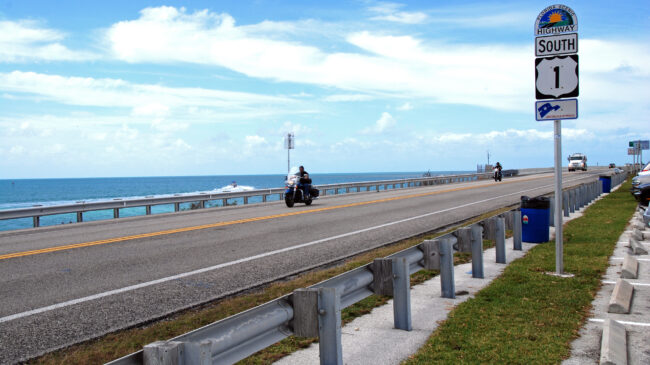As fuel economy rises and the number of electric cars increases in Florida and nationwide, states and the federal government are facing a financial dilemma: how to sustainably fund roads.
In Florida, the average total state gas tax rate is 36.7 cents a gallon. That generates about $4 billion a year to pay for Florida’s roads. But as vehicles get more fuel-efficient and more consumers switch to electric cars, we will pay less in fuel taxes for using the same amount of roads.
Combining forecast data from the Energy Information Administration and Bloomberg, Florida would need to raise its state gas tax over 75 cents a gallon by 2050 just to keep revenue even with today’s levels.
But a new revenue proposal is gaining traction: mileage-based user fees, which are sometimes called road-user charges. This is the concept of charging road users based on the distance traveled rather than by a per-gallon gas tax.
Major Advantages of Mileage-Based User Fees
Here are five major advantages to user fees:
- Fairness. Ensures that those who use the roads and pay the user fees are the ones who receive the benefits.
- Choice. Provides users more control of what, when, and how often they pay.
- Flexibility. Allows state transportation departments the ability to adjust revenues and expenditures as the economy, demand, and technology change.
- Better incentives. Creates incentives for drivers and transportation departments to think seriously about the efficiency, quality, and costs of transportation infrastructure.
- Constraint. Helps prevent over-consumption and negative externalities, such as traffic congestion and pollution.
The fuel tax has largely been a successful user fee in the United States, but its days are numbered. As a replacement to the gas tax, mileage-based user fees (MBUFs) are being tested in pilot projects or used in limited cases. There are still technology, system design and cost issues to be resolved before mileage-based user fees could be fully implemented.
Around the world, New Zealand and Germany have a distance-based fee for trucks. Australia and several European countries are doing pilot projects on applying mileage fees to passenger vehicles.
Here, states have been testing MBUFs for more than a decade. Six years ago, the federal Fixing America’s Surface Transportation Act created the Surface Transportation System Funding Alternatives federal program that awards tax dollars to states to accelerate testing of mileage-based fees.
The Issues for Mileage Fees
- Privacy. The top concerns about mileage-based fees are privacy-related. Many of the privacy issues can be addressed by having users choose to pay a calculated fee with no data collected on their road use. Alternatively, users who choose an option with a technology that measures their road use can determine what data to share and can use private vendors to ensure that the data is not shared with the state—unless users explicitly agree to share it.
- New tax? Some motorists have raised legitimate concerns about MBUFs being an additional user fee. But pilot programs are testing mileage-based fees as a replacement for fuel taxes, not as a new additional charge to drivers.
- Cost of collection. Currently, the cost to collect mileage-based fees is higher than for fuel taxes but does appear to come down with scale. Pilot projects are increasingly exploring how to reduce those costs.
- Equity. All user fees are levied according to use, not according to income or wealth, so they tend to be regressive. A mileage fee is no more regressive than is the fuel tax, so the shift in user fees will not reduce, or increase, the regressivity of the main transportation user fee.
- Rural residents. Many rural residents are concerned MBUFs are not fair to them. But mileage-based fees are often better for rural drivers. Rural residents already pay more in fuel taxes because they tend to use more fuel and have fewer fuel-efficient vehicles.
Research by RAND and by the states of Oregon, Washington and North Carolina found that rural drivers benefit from a shift to mileage-based fees and would pay slightly less. This is appropriate because rural roads also tend to be less expensive to build and maintain than urban ones.
Some environmental groups are worried that MBUFs will discourage the purchase of electric vehicles.
Currently, electric car drivers avoid paying fuel taxes. Asking them to pay a fee for the roads they use is reasonable and fair to other drivers. States that have imposed road-use charges on electric vehicles report no change in the trend of electric vehicle adoption.
MBUFs are a long-term replacement for the gas tax. In the meantime, it is important to continue state pilots, expanding their scale and scope and starting to address the transition issues.
A national mileage-based user fee pilot program should build on tests already done at the state level and could be helpful if it is well designed and executed in ways that allow for larger-scale and more extensive testing.
A version of this column previously appeared in the Sarasota Observer.

